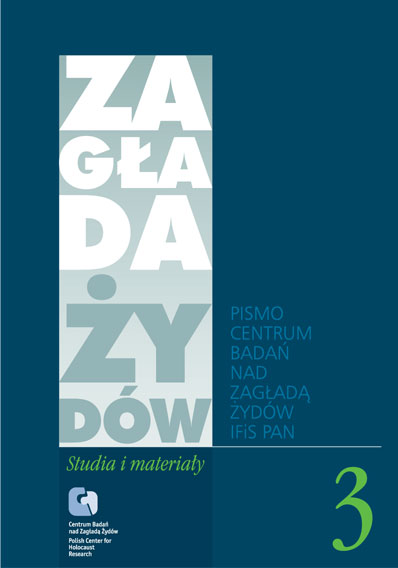Życie i Zagłada w Hrubieszowie w oczach młodej warszawianki
Zagłada Żydów. Studia i Materiały, Nr 3 (2007), strony: 229-240
Data publikacji: 2007-12-01
Abstrakt
This text deals with the situation of the Jewish population of Hrubieszów between autumn 1941 and the first deportation action in June 1942. The author of the testimony is a woman by the name Dychterman, who came to Hrubieszów from the Warsaw ghetto. During the “action” she managed to leave for Warsaw. This testimony was written two weeks later, i.e. in late June 1942 by staff members of Ringelblum’s Archive. It stands out among other testimonies from Hrubieszów in the Warsaw Ghetto Archives, as it is full of details and complex description. It also contains an interesting description of the Jewish community in the town, the living conditions and its everyday life. It also contains data of the Judenrat members as well as observations on the Christian-Jewish relations (i.e. between Jews and Poles or Ukrainians). The second part of the testimony describes the first liquidation action in Hrubieszów, the extermination action and the reactions of the Judenrat and that of the population towards the resettlement. The fate of the author remains unknown. Most likely she died during the “Great Action” in the Warsaw ghetto. This account has been used by historians, but never previously published.
Słowa kluczowe
Hrubieszów, Zagłada, Aktion Reinhardt, archiwum Ringelbluma, życie codzienne Żydów pod okupacją niemiecką
Licencja
Copyright (c) 2007 Zagłada Żydów. Studia i Materiały

Utwór dostępny jest na licencji Creative Commons Uznanie autorstwa – Użycie niekomercyjne – Bez utworów zależnych 4.0 Międzynarodowe.
https://creativecommons.org/licenses/by-nc-nd/4.0
Inne teksty tego samego autora
- Jan Grabowski, Dariusz Libionka, Bezdroża polityki historycznej. Wokół Markowej, czyli o czym nie mówi Muzeum , Zagłada Żydów. Studia i Materiały: Nr 12 (2016)
- Adam Kopciowski, Szama Grajer – „żydowski król” z Lublina , Zagłada Żydów. Studia i Materiały: Nr 16 (2020)
- Dariusz Libionka, Jan Grabowski, Anatomia donosu ks. Stanisława Trzeciaka na ks. Tadeusza Pudra , Zagłada Żydów. Studia i Materiały: Nr 13 (2017)
- Dariusz Libionka, Apocrypha from the History of the Jewish Military Union and its Authors , Zagłada Żydów. Studia i Materiały: 2008: Holocaust Studies and Materials
- Dariusz Libionka, Lokalne struktury Narodowych Sił Zbrojnych wobec ukrywających się Żydów w świetle powojennych materiałów śledczych i procesowych – przypadek powiatów miechowskiego i pińczowskiego , Zagłada Żydów. Studia i Materiały: Nr 16 (2020)
- Dariusz Libionka, Polska Podziemna wobec szantażystów i szmalcowników w Warszawie. Korekta obrazu , Zagłada Żydów. Studia i Materiały: Nr 14 (2018)
- Dariusz Libionka, Zapisy dotyczące Żydów w warszawskich kronikach policyjnych z lat 1942–1944 , Zagłada Żydów. Studia i Materiały: Nr 10 (2014)
- Dariusz Libionka, Prześladowcy Żydów przed Wojskowym Sądem Specjalnym Komendy Głównej AK w 1944 r. , Zagłada Żydów. Studia i Materiały: Nr 15 (2019)
- Dariusz Libionka, Jacek Leociak, 75. rocznica akcji „Reinhardt” , Zagłada Żydów. Studia i Materiały: Nr 13 (2017)
- Adam Kopciowski, Dariusz Libionka, Relacja działaczki Poalej Syjon-Lewicy Poli Elster o sytuacji na Umschlagplatzu i w transporcie do Poniatowej w kwietniu 1943 r , Zagłada Żydów. Studia i Materiały: Nr 19 (2023)
 English
English
 Polish
Polish




